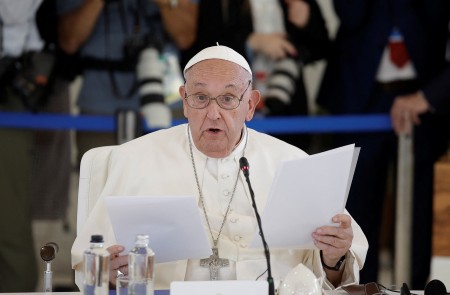BORGO EGNAZIA, Italy (Reuters) – Pope Francis became the first pontiff to address a Group of Seven summit on Friday, warning world leaders that Artificial Intelligence must never be allowed to get the upper hand over humanity.
An array of global chiefs warmly embraced the 87-year-old pope as he made his way around their huge oval table, pushed in a wheelchair as age and infirmity limit his mobility.
The pope said AI represented an “epochal transformation” for mankind, but stressed the need for close oversight of the ever-developing technology to preserve human life and dignity.
“No machine should ever choose to take the life of a human being,” he said, adding that people should not let superpowerful algorithms decide their destiny.
“We would condemn humanity to a future without hope if we took away people’s ability to make decisions about themselves and their lives, by dooming them to depend on the choices of machines,” he warned.
The G7 draws together the leaders of the United States, Germany, Britain, France, Italy, Canada and Japan. In addition, Italian Prime Minister Giorgia Meloni, the summit host, invited 10 other nations to join the talks on Friday, including the prime minister of India and presidents of Turkey and Kenya.
On entering the conference room ahead of his speech, Francis was warmly enveloped by a fellow Argentine, President Javier Milei, received a hug from Jordan’s King Abdullah, a kiss from Canadian Prime Minister Justin Trudeau and had a long, whispered conversation with U.S. President Joe Biden.
Pope Francis acknowledged the ambivalence surrounding AI, saying it could inspire excitement and broaden access to knowledge around the world.
“Yet at the same time, it could bring with it a greater injustice between advanced and developing nations or between dominant and oppressed social classes,” he said.
“It is up to everyone to make good use of (AI) but the onus is on politics to create the conditions for such good use to be possible and fruitful,” he added.
Earlier this year, Italy approved a bill aimed at laying ground rules for the use of AI, setting sanctions for AI-related crimes, and Meloni has repeatedly warned of the risks AI poses to the jobs market.
In a draft of their closing statement, the G7 on Friday said they would draw up a plan to anticipate future skills and education needs to take advantage of the pending AI revolution.
The pope highlighted AI’s potential to take on labour-intensive tasks and engender an “exponential advancement of scientific research”, but he said the machines could also be duped into relaying false information.
“It does not develop new analyses or concepts, but repeats those that it finds,” he said, meaning it ran the risk of legitimising fake news and strengthening already dominant cultures.
(Reporting by Crispian Balmer; Editing by Christina Fincher)
















